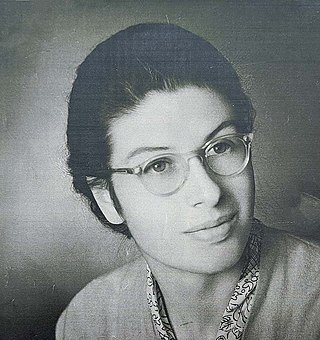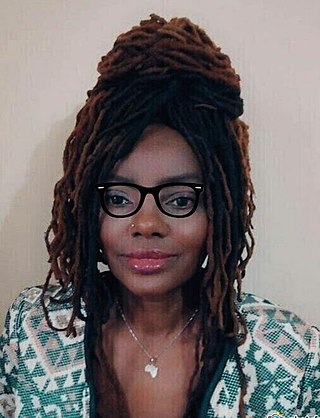Related Research Articles

The Kikuyu are a Bantu ethnic group native to East Africa Central Kenya. At a population of 8,148,668 as of 2019, they account for 17.13% of the total population of Kenya, making them Kenya's largest ethnic group.
Young adult literature (YA) is typically written for readers aged 12 to 18, and includes most of the themes found in adult fiction, such friendship, substance abuse, alcoholism, and sexuality. Stories that focus on the challenges of youth may be further categorized as social or coming-of-age novels.
Meja Mwangi is a Kenyan writer. He has worked in the film industry, including in screenwriting, assistant directing, and casting.

Murang'a County is one of the counties of Kenya's former Central Province. Its largest town and capital is Murang'a, which was referred to as Fort Hall during the colonial era. The county is inhabited mainly by and is considered the birthplace of the Gikuyu, the largest ethnic group in Kenya. The county has a population of 1,056,640 based on the 2019 census.
The Western Australian Premier's Book Awards is an annual book award provided by the Government of Western Australia, and managed by the State Library of Western Australia.

Kenyan literature describes literature which comes from Kenya. Kenya has a long literary tradition, both oral and written; primarily in English and Swahili, the two official languages of the country.

Marjorie Phyllis Oludhe Macgoye was born in Southampton, England, but immigrated to Kenya soon after Kenya became independent. She was a poet, novelist, and a missionary bookseller. She studied at the University of London for both her bachelor and master's degree. In 1954, she moved to Kenya to sell books and, while there, she met Daniel Oludhe Macgoye, a medical doctor, and they were married in 1960. She became a Kenyan citizen in 1964.
Abdilatif Abdalla is a Kenyan writer and political activist. He was imprisoned for his support of the Kenya People's Union, and began writing poetry in solitary confinement. A collection of poems from this time were published as a book titled Sauti ya Dhiki (1973), which was awarded the Jomo Kenyatta Prize for Literature.

Moraa Gitaa is a Kenyan novelist, born in Mombasa. She is also a Peace Studies and Conflict Resolution researcher, cultural advocate and arts curator. She is the author of the YA novels Let's Talk About This, The Kigango Oracle, Hila and The Shark Attack.
Kill Me Quick, published in 1973, is a novel by Meja Mwangi. The novel won the Jomo Kenyatta Prize for Literature in 1974.
Kenyan crime fiction is a genre of crime fiction that is set in the country of Kenya, and usually written by Kenyan authors. According to G.J. Demko of Dartmouth College, "The fundamental premise of all [crime fiction] is a society that is ordered and real but becomes disordered as a result of a crime imposed on that society. In the normal case, a hero arrives - an officer of the law, a private detective or an amateur sleuth - and via logical deduction, hard work or luck, solves the crime, identifies the perpetrator, and order is restored." However, Kenyan crime fiction differs slightly from Demko's definition because of the following reasons: crime is often so pervasive in societies portrayed in Kenyan crime novels that it becomes almost a part of the order, and many times crimes are not conclusively solved by the end of the stories, mimicking the real-life cyclical nature of crime.
Rebecca Nandwa is a Kenyan writer who is best known for her children's books written in Swahili. She has been involved in a wide range of journalism and editorial work and used to be a teacher.
Alice Muthoni Gichuru, who writes as Muthoni wa Gichuru, is a Kenyan writer of fiction for children and young adults, as well as short stories.

TV47 is a television channel based in Kenya. It is owned by Cape Media Limited, an affiliate of Mount Kenya University. It was launched in 2019 by Cape Media Limited, Eugene Anangwe as the Chief Executive Officer and its main broadcast languages are English and Kiswahili. TV47 is a late entrant in the mass media in Kenya. There are more than 50 television stations in Kenya. These stations include Citizen TV, by Royal Media Services of Samuel Kamau Macharia, Kenya Television Network by The Standard (Kenya), NTV by Nation Media Group, and K24 TV by Media Max Limited.
UN Swahili Language Day is observed annually on 7 July. This began when the United Nations declared 7 July as Swahili Language Day in 2022. On 7 July 1954, Tanganyika African National Union (TANU) leader Julius Kambarage Nyerere, the eventual first President of Tanzania, adopted the Swahili Language as a unifying language for African independence struggles. Jomo Kenyatta, the first President of Kenya, followed suit and also used the Swahili language to mobilize and unify the people of Kenya in the struggle against colonialism through the use of the popular “Harambee” slogan.
David Gian Maillu is a Kenyan author and publisher. He is considered East Africa's most prolific writer, having published over 60 books between 1972 and 2021.

Parmenas Githendu Mockerie was a pioneering Kikuyu writer, nationalist and contemporary of Jomo Kenyatta. He published the first book in English by a black Kenyan.
References
- 1 2 3 4 5 6 7 8 9 10 11 12 13 "Jomo Kenyatta Prize for Literature History 2011". Kenya Publishers' Association. 2011. Archived from the original on 21 May 2011. Retrieved 2 December 2015.
- ↑ "New Award to Shake Up Publishing Industry." Africa News Service 10 January 2011. Gale Student Resources in Context GALE|A246092961. Retrieved 12 October 2012.
- ↑ Ngunjiri, Mbugua (30 August 2015). "Must it be called Jomo Kenyatta Prize for Literature?". Standard. Retrieved 20 July 2017.
- ↑ Nation Correspondent (20 September 1999). "No award situation!" Africa News Service. Retrieved 12 October 2012
- ↑ Judges decided that the books that had been submitted lacked creativity and therefore did not award any prize.
- ↑ "Lack of Award Winner an Indictment of Our Writers." Africa News Service 17 October 2005. Gale Student Resources in Context GALE|A137645842. Retrieved 12 October 2012.
- ↑ In 2005, judges failed to award the first prize in the English category, arguing that the titles submitted were not strong enough.
- ↑ "Veteran Writer Oludhe Macgoye Wins Top Award As Book Fair Ends." Africa News Service 1 October 2007. Gale Student Resources in Context GALE|A169300498. Retrieved 12 October 2012.
- ↑ "Jomo Kenyatta Prize for Literature Award 2011". Kenya Publishers' Association. 2012. Archived from the original on 4 July 2012. Retrieved 2 December 2015.
- ↑ Murua, James (4 October 2014). "Kenya: Star Columnist Wins Jomo Kenyatta Literature Award". allafrica.com. Retrieved 2 December 2015.
- ↑ "Owuor wins literature prize at book awards". Daily Nation. Kenya. 28 September 2015. Retrieved 2 December 2015.
- ↑ Murua, James (6 October 2017). "Text Book Center Jomo Kenyatta Prize for Literature 2017 winners announced". Writing Africa. Retrieved 11 May 2024.
- ↑ Murua, James (30 September 2019). "Text Book Centre Jomo Kenyatta Prize for Literature 2019 winners announced". Writing Africa. Retrieved 11 May 2024.